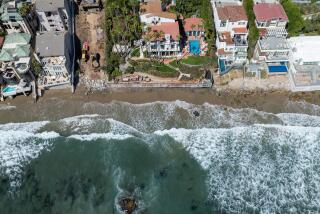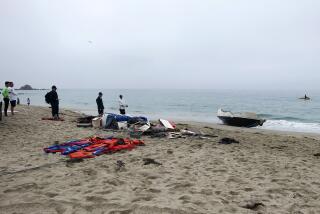If South Florida’s beaches could talk
- Share via
A cow’s head. Lots of truck tires and shattered wooden pallets. Fresh fruit. Even, rarely, human remains.
Each morning the city’s beach cleanup crew heads out on a daily pre-dawn sweep of Fort Lauderdale’s famous beach. They never know what has washed up overnight.
“Mostly what we find is seaweed,” said parks department supervisor Mark Almy. “But there are always surprises that make you ask, ‘How did this get here?’”
Florida has 663 miles of beaches, and over the years the sands have been repositories of everything from stranded ships to messages in bottles. Not to mention drug caches, medical waste, tar balls, refugees from other nations, dead sharks, stingrays and whales, an alligator, a 50-foot mahogany tree, engine blocks, fishing line, drums full of chemicals, dirty diapers, railroad ties and headless chickens.
In Deerfield Beach, parks maintenance manager Jami Moore said the sheriff’s office was recently called out after workers found a device that looked like a bomb.
“It turned out to be a box from a weather balloon,” Moore said. “But the fishing pier was shut down for four to six hours.”
Not long ago in Boca Raton, city crews found about 1,000 shoes that took hours to collect. “Tennis shoes, sandals, flip-flops,” said supervisor Andrew Leganik. The shoes were given to charity.
Over the years, Almy said, he and others in his 20-man Fort Lauderdale crew have learned to be junior detectives in order to return the many cellphones left in the sand. “Almost everyone has a contact in their phone for Mom,” he said. “So we call Mom and tell her that we’ve found their son or daughter’s phone.”
In contrast, things like the cow’s head — likely used as bait for fish or crabs — get disposed of as trash.
“Every day is a new day,” said Steve Salafrio, 42, who has worked the beaches for the public services department in Hollywood, Fla., for 17 years. In that time he has come across a bale of marijuana, an inert Navy training missile and a run-aground Haitian fishing boat carrying 80 migrants, two of whom were dead.
“Not a glamorous thing we do,” said Gary Solomon, of the volunteer group Sand Sifters Beach Cleanup, which makes regular patrols in Boynton Beach and Gulf Stream.
For the crew who patrol the Fort Lauderdale beach, the first look at the shoreline is like awakening to Christmas morning in the dark.
“Bouquets of long-stemmed roses, empty tonic bottles from Costa Rica, a pair of rubber boots. It’s amazing,” Almy said.
Beach cleanup begins at 5:30 a.m., when Bennie Lynch fires up one of three new Caterpillar Challenger tractors: $200,000 rubber-tracked yellow and black behemoths that pull a Barber Surf Rake so sensitive it can pluck a cigarette butt from wet sand.
On a recent Wednesday, Lynch found little but seaweed, lumber and a few dead fish.
But as he crawled down the beach at about 5 miles an hour, he did see several familiar faces: Edna, the elderly Canadian woman who arrives daily with bread for the pigeons; the yoga lady, who greets each sunrise sitting cross-legged on a white sheet; and the homeless, who sleep under piles of blankets.
As the sun began to brighten the sky, Lynch swerved around them. “They won’t move,” he said.
Although a job on the beach may seem like a low-key gig, Moore and Lynch say expectations are high. “It’s really high-pressure and a lot of stress because the seasonal people want the beach to be perfect, just like the picture they have in their mind,” Moore said.
But, he said, “the beach is a live body. It is constantly moving and it can change. The wind can shift and the pristine look is gone.”
Said Lynch, “Tourists don’t want to see seaweed. Or this tractor.”
But the seaweed is constant. In November, said Almy, the beach patrol picked up 300 tons of seaweed, which is moved from the bucket of the Surf Rake into a dump truck and hauled off for composting.
The bounty of the sea is endless, and its workings mysterious. Who knows how a steel rod or a plastic syringe gets carried by the tide to a South Florida beach? But if it washes ashore in Fort Lauderdale, Lynch said, he will pick it up.
More to Read
Sign up for Essential California
The most important California stories and recommendations in your inbox every morning.
You may occasionally receive promotional content from the Los Angeles Times.










